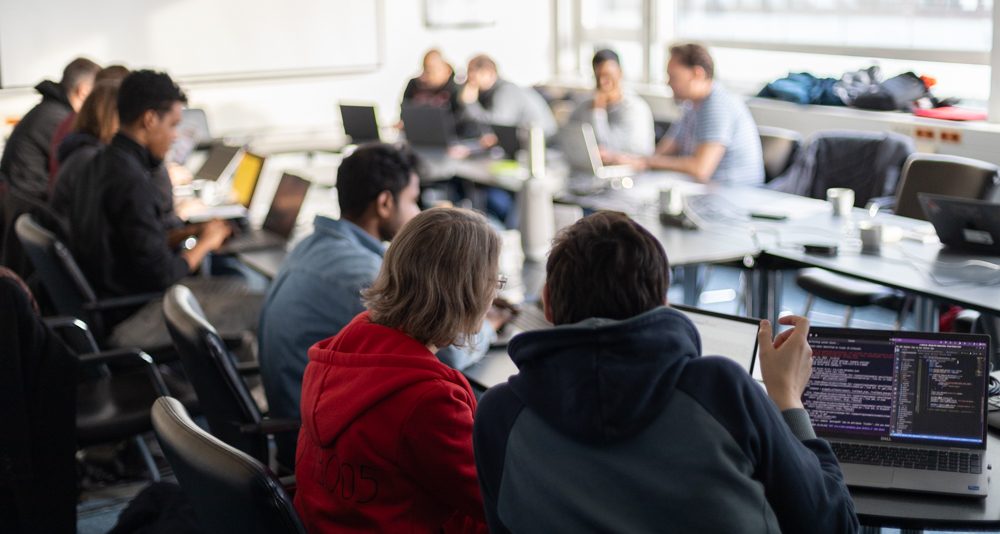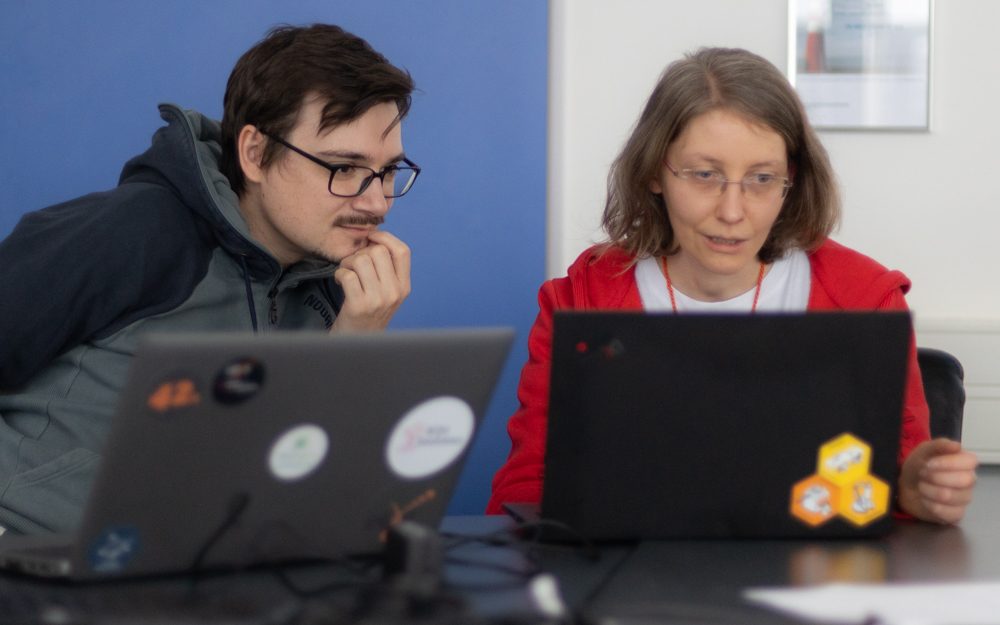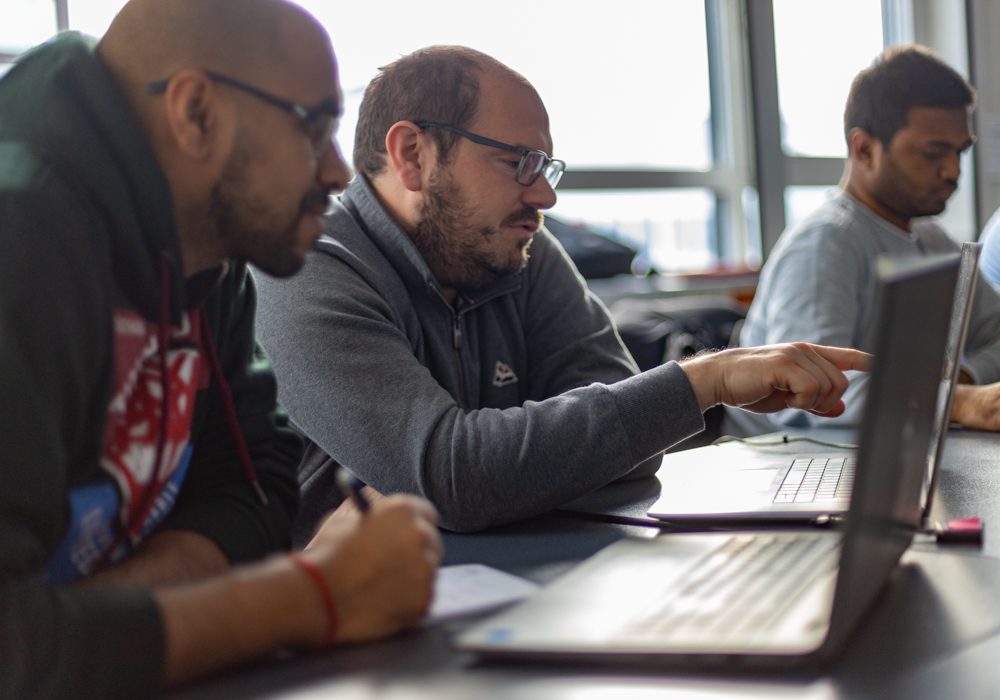Hackathons at ZB MED: Fostering Collaboration and Innovation
Hackathons have become a powerful tool for fostering collaboration, creativity, and innovation. A hackathon is an event where participants come together to solve problems, develop new ideas, and create prototypes in an intensive, time-limited setting. While traditionally associated with software development, hackathons today span a wide range of disciplines and often emphasize brainstorming, discussion, and interdisciplinary teamwork. Hackathons have become a popular format at ZB MED, especially in the Semantic Technologies (SemTec) team. Dr. Leyla Jael Castro, team leader at the SemTec research group, reports on the hackathons organised by her team at ZB MED and the results of these events.
A personal journey into hackathons

My first experience with a hackaton dates back to 2016, when I participated in the BioHackathon Japan, organised by the Database Center for Life Science (DBCLS) and Japan Science and Technology Agency Department for Information Infrastructure (NBDC). I learned how productive, fun, and collaborative hackathons can be – and that they do not necessarily involve coding. In fact, that time I participated with a project on Bioschemas, which required brainstorming, discussions, and further development of the Bioschemas specifications, i.e., metadata schemas based on schema.org.
There were many other topics at the BioHackathon Japan, all of them rooted in the semantic web besides one that was based on life sciences. About 120 people came together to work for six days on around 60 projects, which were grouped under topics defined on the spot. Although the projects were individually proposed, the hacking happened in teams as people would naturally collaborate with each other. There was a strong sense of collective ownership, where „my project“ naturally became „our project“. Yes, hacking probably happened mostly in the hacking room, but ideas were discussed anywhere, anytime – during coffee breaks and lunch, and even also in the Onsen.
Based on the paradigm, which was published in a paper titled „Ten Simple Rules to run a successful BioHackathon“ and the success of the BioHackathon Japan, ELIXIR Europe took the initiative to replicate this model and organised a BioHackathon in Europe.
The first edition took place in 2018, and I was part of the organizing committee for five years. Different from the BioHackathon Japan, the topics of this hackathon aligned to ELIXIR’s priorities, and the approximately 35 projects were proposed by groups rather than individuals, encouraging cross-project collaboration among around 150 participants over five days. In 2022, ELIXIR Germany, led by deNBI, started the series of BioHackathon Germany, adopting the ELIXIR Europe format.
The Emergence of Hackathons at ZB MED
When we needed to bring people together in 2023 to discuss, collaborate and advance topics aligned with NFDI4DataScience, the hackathon format seemed like a natural choice. Although the spirit was essentially the same as in the BioHackathon Japan and BioHackathon Europe – highly productive, fun and collaborative – our hackathons are not necessarily bio-focused and they are much smaller in scale, with fewer people, projects and shorter duration. We therefore call them mini-hackathons, typically involving 12 to 20 participants, one or two topics or projects, and lasting three days.
In 2023, we organised three NFDI4DataScience mini-hackathons, focusing on the topics:
- FAIRification game for research software
- Workflow and metadata schemas for FAIR machine learning models
- Machine-actionable Software Management Plans
For each event, we identified experts working on similar topics and invited them to participate. In 2024, we refined our approach by first gathering expressions of interest and then selecting participants based on expertise and availability. This led to two mini-hackathons on the topics:
- Machine-actionability for NFDI data management plans
- Webby FDOs with RO-Crates and Signposting, and FDO flavor based on common semantic approaches
The impact of mini-hackatons
Although the organisation of these events can be challenging – it takes a lot of time and can be quite stressful – the results have always been remarkable. They have helped us advance topics and projects. Following open science principles, we make results available through our SemTec community on Zenodo.
Mini-hackathons have been so valuable to us that we have also organised some internal team hackathons at ZB MED. These one- or two-day events – mostly held in person – bring the entire Semantic Technologies team together to work on features we want to learn more about, such as Large Language Models (LLM), or to improve, such as good practices for research software development.
I am truly grateful to the SemTec team for being that enthusiastic about these internal hackathons. They strengthen our teamwork and organizational capabilities and enhance research and development skills.
Looking Ahead
Building on the successes of our 2023 and 2024 NFDI4DS mini-hackathons, we are planning three hackathons in 2025, focusing on:
- Bioschemas coding hackathon
- Metadata and quality for research software
- Metadata for training materials
With each event, we continue to refine our approach, ensuring that hackathons at ZB MED remain an effective platform for collaboration, innovation, and impactful research.
Reports from the past hackathons at ZB MED
On the topic of machine-actionable software management plans (maSMPs)
- Castro, L. J., Geist, L., Gonzalez, E., Gonzalez-Ocanto, M., Grossmann, Y. V., Pronk, T., Solanki, D., Utrilla Guerrero, C., Wallace, D., & Windeck, J. (2023). Five Minutes to Write a Software Management Plan – A Machine-actionable Approach to Simplify the Creation of SMPs. Zenodo. https://doi.org/10.5281/zenodo.10374839
- Castro, L. J., Gonzalez, E., Grossmann, Y. V., Solanki, D., & Utrilla, C. (2023). Metadata crosswalks for software management plans at NFDI4DS hackathon maSMP 2023 [Data set]. Zenodo. https://doi.org/10.5281/zenodo.10275895
On the topic of metadata and FAIR for Machine Learning (FAIR4ML)
- Castro, L. J., Beuttenmüller, F., Chen, Z., Efeoglu, S., Garijo, D., Psomopoulos, F., Serrano-Solano, B., Shiferaw, K. B., Solanki, D., Wentzel, B., & Zhang, Y. (2023). Towards metadata for machine learning – Crosswalk tables [Data set]. Zenodo. https://doi.org/10.5281/zenodo.10407320
- Castro, L. J., Psomopoulos, F., Serrano-Solano, B., Sharma, C., Shiferaw, K. B., Solanki, D., & Zhang, Y. (2023). Lifecycle for FAIR Machine Learning. Zenodo. https://doi.org/10.5281/zenodo.10407265
On the topic of FAIRification for Research Software
- Ravinder, R., Solanki, D., Carta, C., Dos Santos Vieira, B., Keller, J., Roos, M., & Castro, L. J. (2024). Designing a FAIRification game for Research Software – Poster. https://doi.org/10.4126/FRL01-006473216



